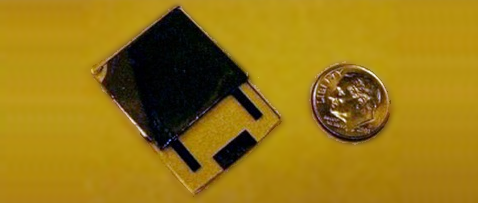Coin-sized nuclear batteries to revolutionise electronics

A nuclear battery is not a new concept. For years they have been praised for their longevity and ability to keep running for years, decades longer than the lifespan of ordinary batteries.
Research engineers at the University of Missouri have developed a battery which takes advantage of the decay of benign radioactive elements to create electricity. While nuclear batteries have been used in healthcare, space equipment and military devices, the potential they hold could rule out the need for wireless power.
The real development here is the size factor. Before this feat of engineering, due to the nature of the battery, the radioactive element would decay and provide power, but in the process would damage the semiconductor device which actually collects the energy.

But through using a liquid semiconductor, the particles radiating from the radioactive isotope can pass through more fluidly causing far less damage, as the particles in liquids are far more spread out than those of a solid.
According to the BBC, not only could these devices potentially last hundreds of years, the "renewable factor" could be fixed before the problem even arose.
Gadgets and items of technology last a set number of months or years through either a product life cycle or overuse. But the battery could be taken out, recycled and put into a new device which would carry on going. Why dispose of a battery which not only has a precious element to it, but will continue working for longer after the owner has died?
Digressing for a second - could nuclear batteries be device-generic in the near future? Manufacturers could cut the cost of devices down by removing any battery or power equipment, and have a slide-in battery which you buy separately, and can swap and change with other devices like a universal battery port as and when the device fails or gets replaced.
Some would be naturally concerned with the "nuclear" element to this. For example, terrorists using this to cause mass casualties or death; it simply cannot be used in this way.
But this technology strikes a personal note for me. I wrote a few weeks ago about an experimental surgery called deep-brain stimulation which can mask the symptoms of serious neurological illnesses - Parkinson's, dystonia, and Tourette's syndrome - the condition I suffer from.
By using this technology, the pacemaker which will be fitted in the space between my scapula (shoulder blade) and clavicle (collarbone) could be far smaller than the cigarette-box-sized device which is normally used. They now have these devices to just larger than a coin, and hope in the future could be even smaller and almost seamless with the devices they power.
But take the medical element of the equation for a moment. Just think what this technology could mean for laptops, notebooks, mobile phones; perhaps even further - why couldn't this be installed in televisions which eat up electricity like no other?
Could nuclear energy (in this respect, at least) be the saviour of the planet that we have all hoped for? Let me know what you think.